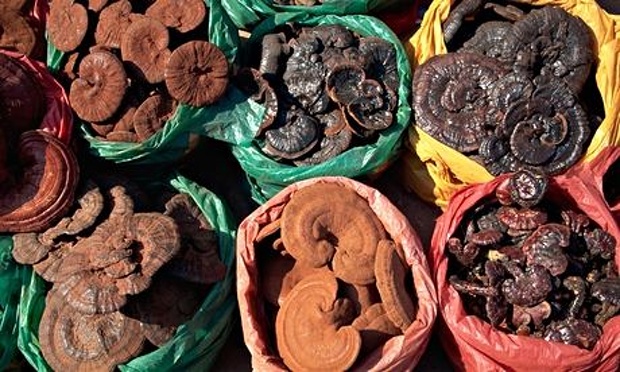Cancer affects millions of individuals annually. Although some cancers are treated with success, research continues in order to find a cure for all types. At this time, reishi mushroom is being studied based on its potential positive effects regarding cancer treatment.
Sometimes used as an immune stimulant, reishi mushroom is given to cancer patients and individuals with other diseases. The advances of reishi mushroom within clinical settings may be more recent, however, this mushroom has a long history within traditional medicine throughout Asia.
Before reishi mushroom is used by Western medical doctors, further research will need to be conducted. At this time, it is not currently approved by the FDA regarding the prevention or treatment of cancer. With that being said, this mushroom offers clear benefits which are highlighted below.
What Exactly is Reishi Extract?
Also known by its Chinese name, lingzhi, this mushroom is often referred to as the mushroom of immortality based on its positive health benefits. Utilized for thousands of years throughout China, Japan, Vietnam, and Korea, this mushroom does not have gills on its underside.
Instead, it’s classified as polypores, meaning that it releases spores through its pores. These mushrooms grow on tree stumps or can also be found on decaying wood. Referred to as saprotrophs, these mushrooms extract nutrients from the organic matter in which it’s growing on.
Based on their immense history throughout Asia, reishi mushrooms seem to be well tolerated in humans, however, further research is still required to better understand how safe they are for human consumption. Within traditional medicine, reishi has been used to promote and balance positive health.
By taking this mushroom, individuals are able to positively impact their glands and organs, enhancing vitality, while decreasing the risk of disease and combating fatigue. At this time, reishi is mainly being studied as an immune stimulant and as a supportive therapy option for cancer patients.
How Does Reishi Mushroom Target Symptoms of Cancer?
Being a plant, reishi offers phytonutrients which are nutrients found in plants. These phytonutrients are believed to support a number of health ailments, including cancer. More specifically, reishi mushroom provides beta-glucan polysaccharides and ganoderic acid triterpenoids.
By consuming these components, individuals experience vasodilation as their blood vessels expand. They also benefit from reishi’s antiviral, anti-inflammatory, renoprotective, and immunomodulatory properties. What is interesting, is that this mushroom has been shown to offer anti-tumor effects as well. This effect has been reported regarding both benign and malignant tumor cells.
When studied in mice, between 95 and 98 percent experienced positive effects, inhibiting sarcomas via reishi injections. Reishi extracts have also been shown to offer chemo-preventive properties, reducing the overall probability that new cancers will develop. Some of the other effects of this mushroom include:
- Reducing nausea associated with chemotherapy
- Improved efficacy of radiation therapies
- Increasing the sensitivity of chemo drugs within ovarian cells
- Improving nephrotoxicity and immune responses in cancer patients
Studies so far are promising, however, there is not enough evidence at this time, to say for certain that reishi mushroom can benefit cancer patients, replacing other treatment options. With that being said, when studied, reishi mushroom was shown to produce these effects:
- Ganoderic acid, found in reishi mushrooms, have been shown to inhibit tumor development
- Reishi has been shown to boost immune function
- Reishi extract elevates antioxidants in plasma
- Limits the proliferation of ovarian cancer cells
- And more
Phytonutrients within Reishi
Reishi mushrooms contain various phytonutrients, which have been observed to fight against certain forms of cancer. Exhibiting low toxicity levels, making them ideal for the treatment of cancer. More specifically, reishi mushrooms contain lectins, adenosine, beta-glucan, polysaccharides, and other substances which exhibit anticancer effects.
Researchers believe that reishi’s anti-cancer effects are based on a number of mechanisms. These phytochemicals are believed to boost immune function, induce activity regarding antioxidants, and support tumor cell death. At this time, research continues, as scientists isolate chemicals within this mushroom, aiming to pinpoint it potential cancer-fighting effects.
Are There Any Side Effects of Reishi Mushroom?
For the most part, reishi mushrooms are well tolerated in humans. Based on their long history, very few side effects have actually been reported. In more cases, however, extreme toxicity has been correlated with reishi powder. When mild side effects are experienced, individual may report dry mouth, bloody noses, rashes, nausea, dry throat, and headaches.
When taking this mushroom, some individuals have experienced a drop in their blood glucose levels. Based on this effect, reishi mushroom isn’t recommended for those who have diabetes. This mushroom may also decrease overall blood pressure and is not recommended for anyone taking hypertension medications.
If you are currently taking anticoagulants or anti-platelet medications, you should not take reishi mushrooms. Also, pregnant individuals and nursing women should refrain from taking this supplement. The same is true for those who suffer from liver or kidney disease. If you have any questions, please speak with your healthcare provider.
